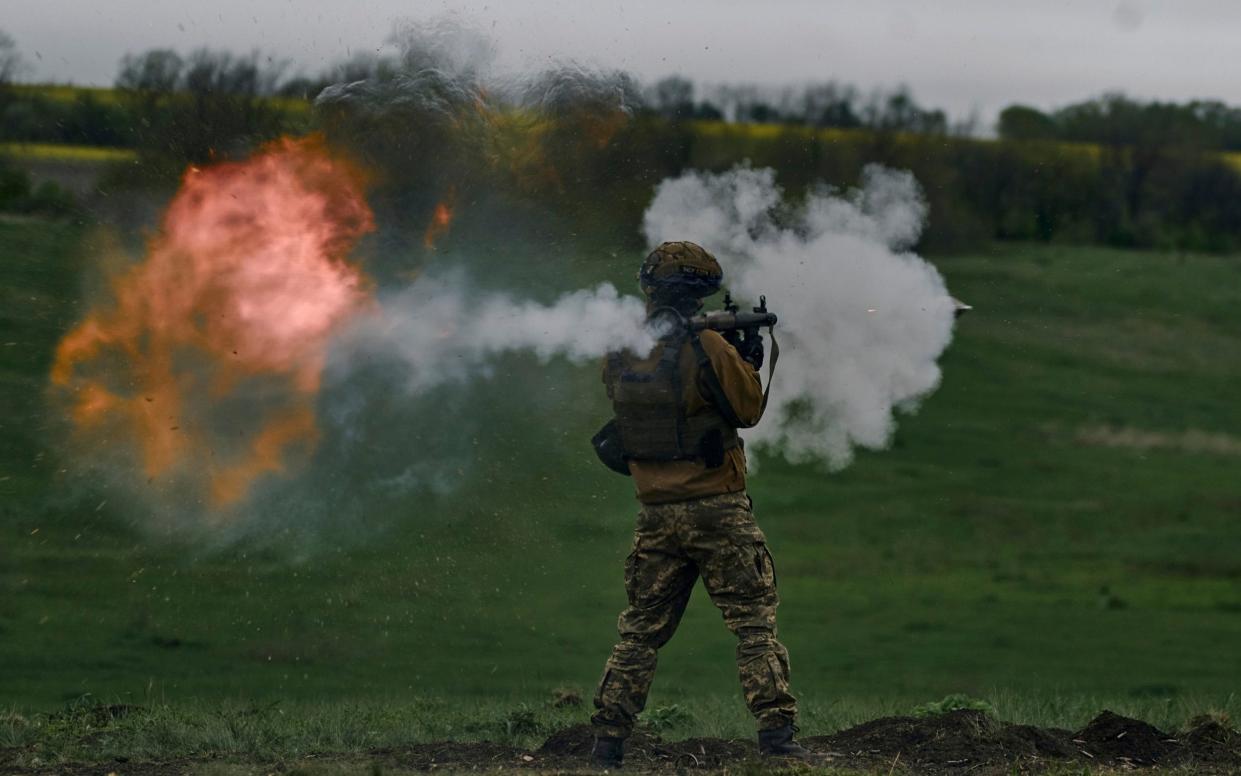Russia may soon come under merciless attack

- Oops!Something went wrong.Please try again later.
Who was responsible for yesterday’s dramatic drone attack in Moscow? We may never know. But it has displayed Vladimir Putin’s biggest fear – because for all the talk of Ukraine staring down the barrel of defeat, the Kremlin knows that Ukraine is far from willing to run up the white flag just yet.
More than a year since the invasion of Ukraine, the conflict is now languishing in its phoney war phase, with both sides launching occasional attacks designed to test the defensive readiness of their adversaries, as well as disrupt any preparations they may be making to launch fresh military offensives later this spring.
In the past week we have seen drones targeting a Russian fuel dump in Crimea, and the Russians launching missile strikes against a Ukrainian ammunition depot in the south-east of the country.
In this context, the suggestion by Moscow that Ukraine was responsible for launching the drone attack against the Kremlin – which Russian officials insist was an attempt to assassinate Putin – indicates that the conflict is about to rise to a dangerous new level.
Of course, Moscow itself has shown no compunction about launching attacks against Ukrainian neighbourhoods. Last week 23 civilians were killed when a Russian missile hit a Ukrainian apartment block in Uman. But any suggestion that the Ukrainians might respond in kind, and launch their own attacks against Russia proper, has been discouraged, especially by Kyiv’s Western allies who are reluctant to see any weaponry they have supplied used in such an offensive capability.
Washington’s direct interference in Ukraine’s war effort was highlighted in leaked US national security documents, which suggested that the Ukrainians cancelled planned strikes against Russia to mark the first anniversary of the start of the war on February 24. US officials were concerned that the strikes would provoke a major escalation in the conflict, and pressured Ukraine’s intelligence service, the HUR, to call off the action.
Now, though, Ukrainian commanders are becoming increasingly frustrated at the reluctance of the West to provide them with the weapons they need to prevail on the battlefield in their own land. This has forced them to be resourceful, developing their own munitions.
As reported in The Telegraph, Ukrainian engineers have designed a “people’s missile” using similar technology to the German V1 “doodlebug” rocket that terrorised London during the Second World War, and which has almost doubled the range of the US-supplied Himar rocket systems. In addition, they have been busy producing their own fleet of long-range drones, which can carry payloads of 300 kilograms and fly up to several thousand kilometres, depending on their configuration.
Having the ability to develop their own weaponry certainly allows the Ukrainians a degree of flexibility in choosing their targets – a luxury they were not allowed when they were obliged to accept the constraints imposed on their military operations by Western allies.
Moreover, while sources in Kyiv have denied their involvement in yesterday’s drone attack on the Kremlin, the fact that the Russian capital is coming under attack suggests the next phase of the conflict will not be confined to Ukrainian territory. Whether the threat is from Russian dissidents or the Ukrainians, the Kremlin is firmly in the target zone.
We already know that Ukraine has the capability to conduct drone strikes deep within Russia: it has been taking place since the end of last year when Kyiv attacked two Russian air bases, one of them located just 150 miles from Moscow. This is a reflection of the country’s deep commitment to winning the war – even if its much-vaunted spring offensive has been delayed, prompting suggestions that the Ukrainian war effort, which made a number of impressive gains towards the end of last year, is beginning to falter.
The Ukrainians are certainly in a better position than their Russian counterparts who, for all Putin’s bravado, remain deeply demoralised and seemingly incapable of achieving a breakthrough. Despite five months of intense fighting to capture the eastern city of Bakhmut, the Russians are still struggling to achieve their objective in a campaign that has, according to the latest US national security estimates, claimed more than 20,000 Russian lives, with 80,000 more being wounded.
The utter incompetence of the Russian war effort has certainly stunned many senior British military officers who earned their spurs during the Soviet era, and came to regard the Russians as a formidable adversary. As one former Army chief observed to me recently, “They have failed miserably at every conceivable level.”
In such circumstances, and with Putin firing yet another defence minister, Russia’s ability to win this war must be in doubt, while Ukraine’s prospects grow stronger by the day.

